Table of Contents
- Why Facebook comment moderation matters for your brand
- What does a Facebook comment moderator actually do?
- The challenges of moderating Facebook comments manually
- How to improve comment moderation on Facebook
- Automate Facebook comment moderation
- Best practices for Facebook comment moderation
- Don’t ignore Facebook comments, thank NapoleonCat later
- Facebook comment moderation tool – FAQs
When you’re running multiple Pages, campaigns, and ad accounts on Facebook, moderating comments is basically a full-time job, usually, for multiple people.
But you can make it more efficient and save some of that precious time with the right Facebook comment moderation tool. Of course, I’ll show you how. 🙂
- Why Facebook comment moderation matters for your brand
- What does a Facebook comment moderator actually do?
- The challenges of moderating Facebook comments manually
- How to improve comment moderation on Facebook
- Automate Facebook comment moderation
- Best practices for Facebook comment moderation
- Don’t ignore Facebook comments, thank NapoleonCat later
- Facebook comment moderation tool – FAQs
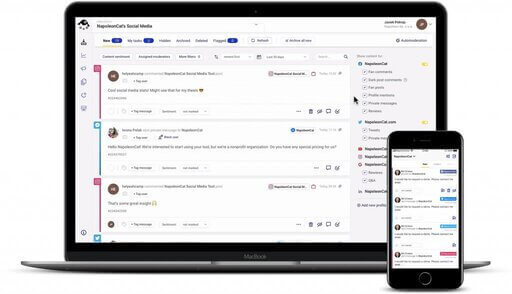
The best Facebook comment moderation tool
Use NapoleonCat to manage all your organic and ad comments – all from one simple dashboard. Automate repetitive comments and automatically delete spam.
Why Facebook comment moderation matters for your brand
If your brand is active on Facebook, you already know how important comments can be (I hope!). They’re where your audience asks questions, shares feedback, engages with your campaigns, and also, unfortunately, sometimes leaves complaints or spam. (Which shouldn’t be the reason you neglect your comment section, btw.)
Comments can help build stronger relationships with your community, but they can just as easily harm your reputation if you leave them unattended. A single unanswered customer question, a rude comment, a spammy scam link under your ad – can all impact how people see and interact with your brand.
That’s why Facebook comment moderation should be on your radar at all times. Not just deleting the spam – that’s important, sure. But you also need to interact with your audience on a regular basis to improve customer service and build a positive brand image (which, by the way, is not a one-time thing but rather a continuous effort).
But how do you make moderation manageable when you’re running multiple campaigns and Pages, with hundreds (or thousands) of comments to deal with? I have just the right tool in mind – just give me a couple article sections.
What does a Facebook comment moderator actually do?
A Facebook comment moderator has a deceptively simple job: manage and respond to comments. But don’t get fooled (if you’ve ever done that, I know you won’t). It’s much more complex than that. Moderators have to:
- Answer customer questions quickly and accurately.
- Respond to feedback, both positive and negative (and sometimes contact the client beforehand).
- Protect the community from spam, scams, and trolls.
- Keep the brand voice consistent across all replies.
- Escalate issues internally when comments need specialist support.
And on top, moderators often juggle private messages, reviews, mentions – because it’s not just comments on Page posts. And when ads enter the picture, the challenge becomes even bigger. And those have comments, too, that equally need to be moderated.

Automatically Block Spam with AI Precision
Automatically hide or delete spam and hate comments on your posts and ads across all your IG profiles, powered by advanced AI.
The challenges of moderating Facebook comments manually
If you’ve ever tried managing comments directly on Facebook or through the Meta Business Suite or Ads Manager, you know the struggle. If you haven’t, well, here are some of the challenges:
- Fragmented inboxes. Comments are spread across organic posts, ads, Messenger, and reviews, and it’s really easy to miss something important.
- Volume. Campaigns can generate hundreds of comments in hours. Too many to keep up with manually.
- Time pressure. Customers expect fast replies, while you switch between multiple tabs and inboxes, wasting time in between.
- Spam and trolls. They pop up under ads and can ruin the experience for genuine customers, not to mention hurt your reputation – and your ad budget.
- Team coordination. If you don’t have clear workflows, messages get duplicated, lost, or left unanswered.
But there’s a solution to each of those challenges – and you can find it in one Facebook comment moderation tool. 😲
How to improve comment moderation on Facebook
Improving Facebook comment moderation (and social media comment moderation in general) really comes down to two things: a) centralizing your workflows and b) automating repetitive tasks. Which is what NapoleonCat’s Facebook management tools for business help you do.
NapoleonCat is built to handle the complexity of managing customer interactions at scale without losing the human touch.
Let me show you how it works in practice.
Monitor and respond to all Facebook comments (organic & ads) from one dashboard
Instead of switching between Facebook Pages, Meta Business Suite, and Ads Manager, NapoleonCat has it all in a single dashboard. Every comment, message, and review is lined up for you to look at in the Social Inbox – and you’ll never miss an opportunity to engage with your audience (or remove spam).
This means you can:
- See all organic and paid comments in one place.
- Reply directly from the dashboard without opening Facebook.
- Handle both day-to-day engagement and high-volume ad campaigns, all from one place.
- Moderate Facebook comments next to the engagement on other social media platforms in the same dashboard, as the interactions happen.
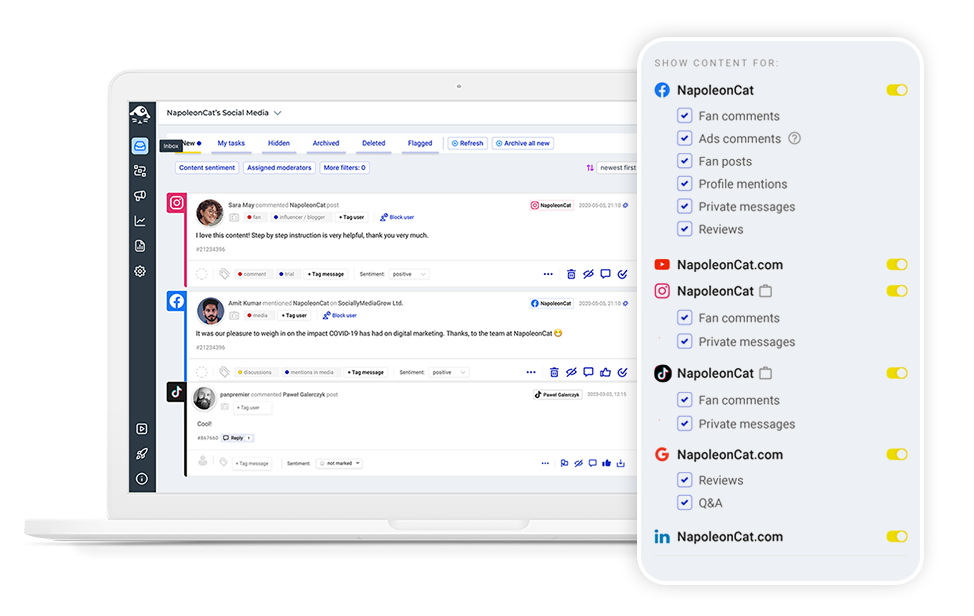
What’s more, if your brand manages multiple Facebook Pages or if you’re an agency handling accounts for several clients, NapoleonCat will let you connect all your Pages and ad accounts into one inbox. You can switch between them instantly without logging in and out or juggling browser tabs.
To keep things in order, you can divide the accounts into separate client Workspaces, each with a separate team, social media accounts, and even user tags and saved replies.
Manage Facebook reviews, mentions, private messages & more
Customer interactions on Facebook also include reviews, brand mentions, and private messages. With NapoleonCat, you can manage them all from the same place you moderate comments.
- Handle reviews alongside comments to keep your brand reputation in check. Reviews are often the first thing people check when researching a brand. Responding quickly to address complaints or even thank happy customers shows people you care. And NapoleonCat pulls reviews into your Inbox so you can reply in seconds.
- Respond to brand mentions in real time to join conversations outside your own Page. Not all conversations about your brand happen on your Page. With NapoleonCat, you can monitor mentions across Facebook and engage where it matters, helping you manage your reputation proactively.
- Manage Messenger conversations from the same dashboard without juggling multiple tabs. Messenger is where many customers go for direct support. Instead of handling it separately, NapoleonCat puts Messenger messages right in your Inbox with comments and reviews.
- Centralize customer interactions across organic, paid, and private channels. NapoleonCat turns scattered Facebook interactions into a single, manageable workflow.
Collaborate easily with your team
Moderation requires teamwork – especially on larger campaigns and at scale. NapoleonCat was built with teams in mind, helping moderators and the customer service team work together on social media engagement. Using the Social Inbox, you can:
- Assign messages and comment threads to the right team member, without confusion or overlap.
- Add internal notes so your team has context before replying.
- Track progress to make sure nothing slips through the cracks. The dashboard will show you which comments are taken care of and which need attention, with clear and transparent moderation workflows.
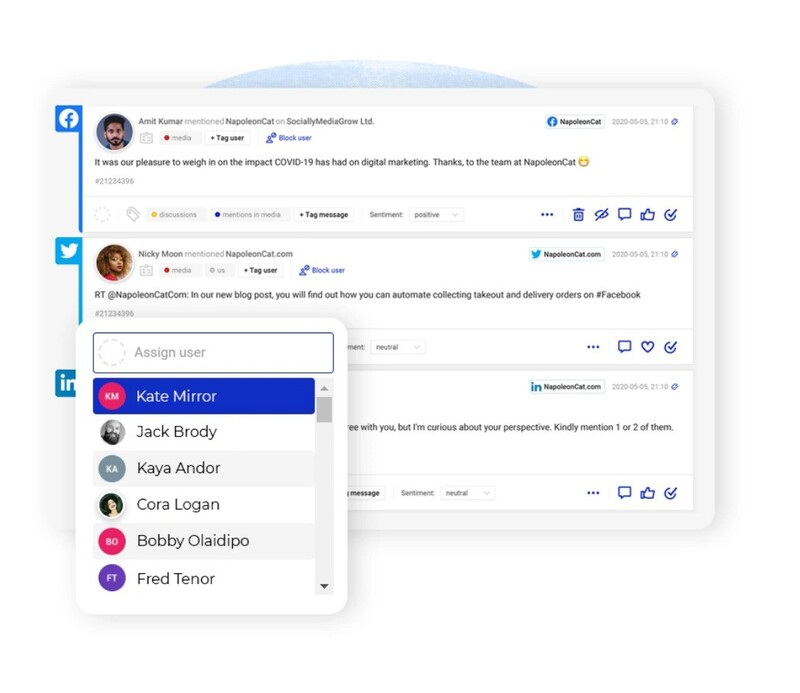
Keep a consistent brand voice
When many people reply to comments for a single brand, it might be tricky to sound like the same brand all the time. And if you don’t keep a consistent brand voice, your audience might have a hard time building a consistent image of your brand in their heads.
But of course, the Social Inbox will help you with that, too:
- Use saved reply templates for quick and consistent answers. Set up ready-to-use templates for common questions – you can have different sets for different workspaces and clients, helping differentiate between specific communication guidelines.
- Train new team members faster with built-in workflows. Workflows and reply templates shorten the learning curve and reduce the risk of off-brand replies.
Track and improve your performance
Good moderation is measurable. Period. And NapoleonCat gives you analytics and reporting tools to track:
- Response times so you can measure customer service efficiency.
- Team productivity to see how the workload is distributed.
- Engagement trends across posts and campaigns, helping you refine your strategy.
You can also generate easy-to-share reports for managers or clients, perfect for proving ROI on moderation efforts. You can even schedule them to go out weekly or monthly, making reporting a breeze and impressing your clients with minimum effort (into reporting itself, that is. The moderation work needs to be done, anyway, sorry! But don’t forget, some of it can be automated.)
Build better customer relationships with Social CRM
Every interaction on social media is a chance to build stronger customer relationships. And it’s not just a nice-sounding slogan – this is, in fact, how you build brand communities.
NapoleonCat’s Social CRM tool helps you do that and go beyond one-off replies to your customers and followers:
- Keep complete and accurate customer profiles. You’ll see every interaction in the profile, so you have context for future conversations, no matter who on your team picks it up. You’ll also see any tags the person has in NapoleonCat, so you’ll know whether someone is a long-time customer or a brand hater.
- Personalize engagement and improve response quality. Knowing a customer’s history with your brand makes it easier to provide tailored, empathetic support.
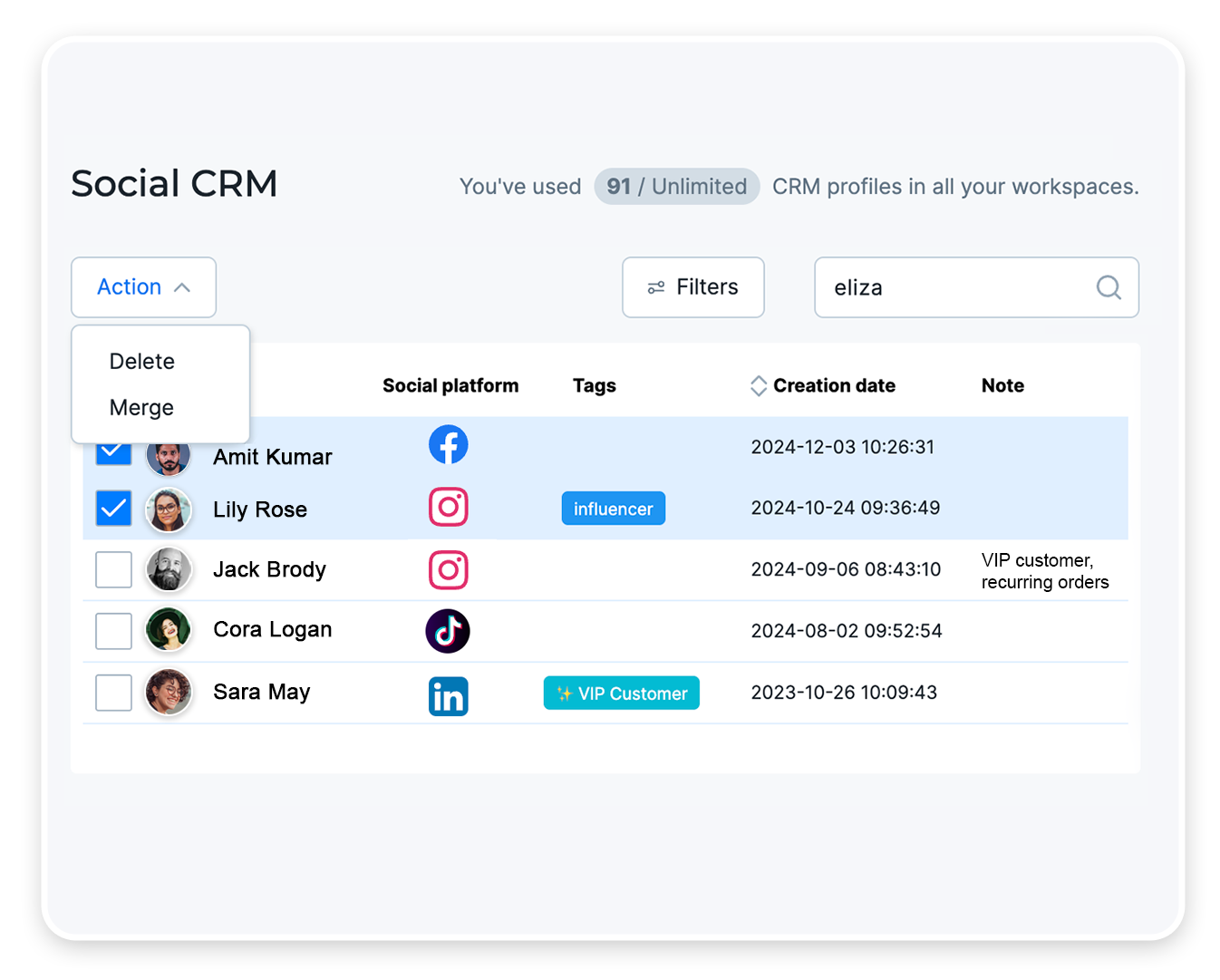
Automate Facebook comment moderation
Not every comment needs to be sent manually. You can safely automate answers to repetitive questions or deleting spammy comments, and have more time for the conversations that indeed require human attention. And you can do that with NapoleonCat’s Auto-moderation feature.
- Set up auto-replies for comments, messages, and reviews. For FAQs like “What are your opening hours?” you can send automatic responses and free up your team’s time to handle more complicated topics.
- Automatically hide or delete spam comments (on organic posts and ads). Spammy links, scams, or offensive content – you can easily stop them from cluttering your posts (and taking your team away from the important conversations).
- Automatically block trolls on Facebook and save your team from wasting time on arguing with them.
- Assign specific comment threads to team members for follow-up. Auto-moderation can route important comments to the right team member instantly, based on who they’re from or what’s in them.
- You can also use the AI Assistant in the Social Inbox to trigger Auto-moderation rules for spam, hate, or negative comments, so the process runs entirely in the background.
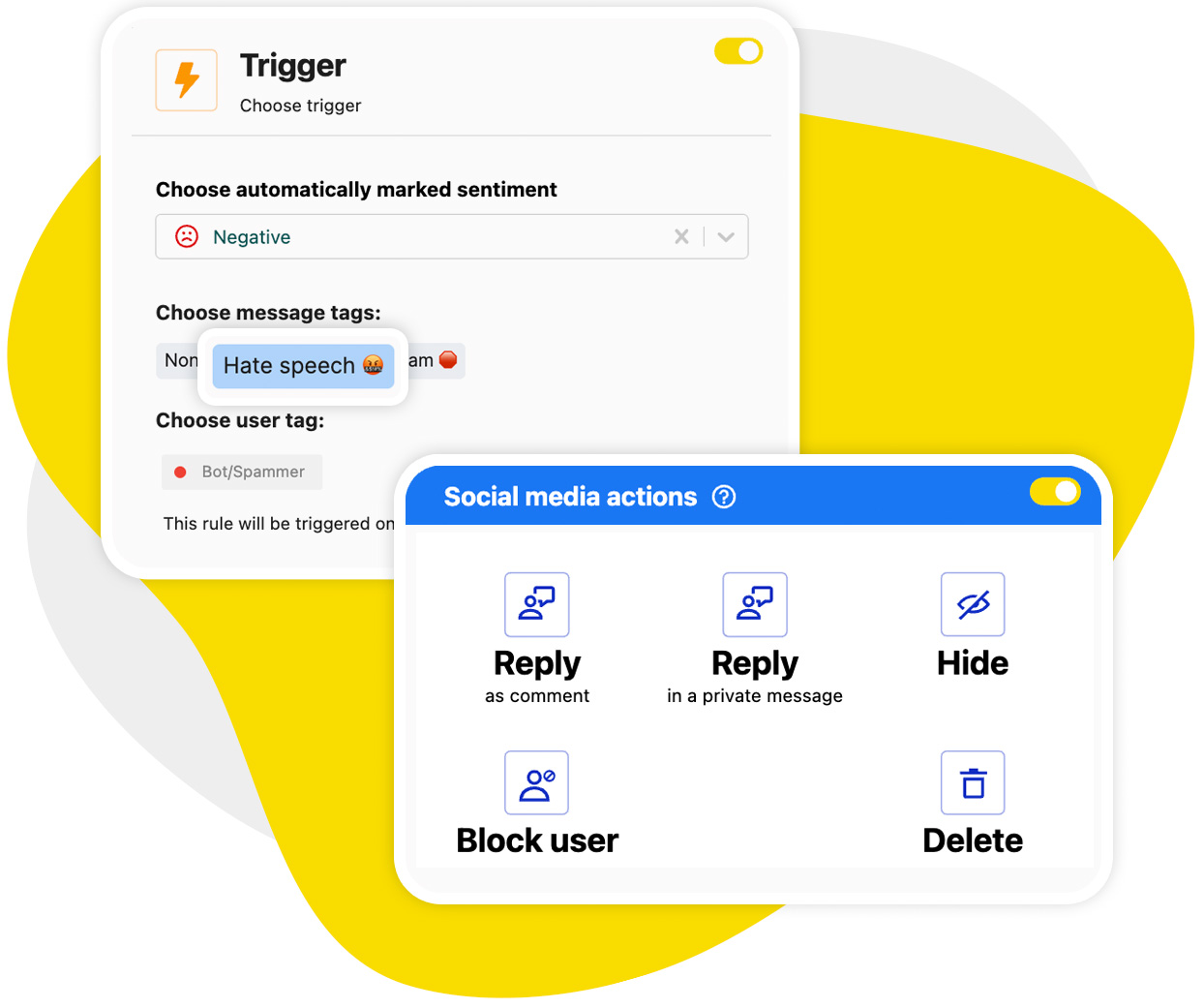

Automatically Block Spam with AI Precision
Automatically hide or delete spam and hate comments on your posts and ads across all your IG profiles, powered by advanced AI.
Best practices for Facebook comment moderation
Okay, so you have a Facebook comment moderation tool, but that’s just (an important) part of the story. You also need clear processes and thoughtful strategies. Here are some best practices to keep your moderation consistent, efficient, and customer-friendly.
Create clear community guidelines
Your community will feel safer and more welcoming when everyone knows the rules. Publish simple, accessible community guidelines on your Facebook Page, outlining:
- What kind of language and behavior is acceptable.
- Policies on spam, self-promotion, and off-topic posts.
- How you handle offensive or abusive comments.
- What customers can expect in terms of response times.
It sets the tone both for your team and your community, but it also makes moderation decisions more transparent. You can even point to these rules when explaining why a comment was hidden or deleted.
Train your moderation team on tone and consistency
Your team is the voice of your brand (or your client brands). So, to keep that voice consistent:
- Create a brand voice guide with examples of preferred language and tone.
- Provide do’s and don’ts (e.g., use friendly, conversational language; avoid jargon, etc.).
- Share sample responses to common questions or complaints.
Saved replies and templates can also help maintain this consistency across moderators and accounts.
Track response times and satisfaction
Say what you want, but speed matters. Customers who wait too long for answers may give up, or worse, vent their frustration publicly. To avoid that:
- Set internal goals for average response times.
- Use NapoleonCat’s analytics to measure how quickly your team replies.
- Gather feedback when possible to measure customer satisfaction. Over time, you’ll see which areas need improvement.
Use analytics to improve your moderation strategy
Speaking of analytics, regularly reviewing your moderation metrics can help you identify trends and opportunities. For example:
- Which posts or ad types generate the most spam?
- What topics spark the most positive engagement?
- Are there recurring questions that could be automated with Auto-moderation?
- Are your response times improving over time?
Use these insights to refine your campaigns and moderation workflows.
Balance automation with human interaction
Automation is really helpful, but it shouldn’t completely replace genuine, human conversations on your brand profiles. So:
- Use Auto-moderation for repetitive questions, spam, and trolls – and for high-volume campaigns, crises, and busy holiday seasons to support your team.
- Reserve sensitive, complex, or emotional issues for your human team.
- Regularly review automation rules to make sure they’re still aligned with customer needs.
Document escalation paths for sensitive issues
Not every comment can be handled by your social team alone. Some may need input from PR, legal, or product specialists. So, create clear workflows for escalation:
- Define who’s responsible for handling specific issues and when to escalate.
- Train your team to recognize red flags (e.g., legal threats, safety issues, viral complaints).
Proactively engage instead of just reacting
Moderation doesn’t stop at removing spam or answering questions. You need to keep fostering community, basically non-stop. You can do that by:
- Liking and replying to positive comments.
- Starting conversations by asking follow-up questions.
- Thanking customers for feedback, even when it contains criticism.
Prepare for high-volume campaigns
Product launches, seasonal sales, and ad campaigns can create sudden comment surges. If you plan ahead, you can stay in control without having to expand your team or make them work after hours.
- Use Auto-moderation rules to filter out spam before it overwhelms your team. (In fact, I suggest you do it 24/7 – that’s the easiest thing to automate, and it can save tons of time for your team.)
- Assign moderators in shifts to cover busy periods.
- Draft reply templates for FAQs you know will come up.
Don’t ignore Facebook comments, thank NapoleonCat later
Facebook comments are where your audience connects with your brand, so ignoring them isn’t an option. With NapoleonCat, you can keep your comment sections clean, respond faster, and protect your brand reputation without all the chaos.
I suggest you try it yourself – it’s completely free for 14 days (and then, you won’t want to quit anyway.)

The best Facebook comment moderation tool
Use NapoleonCat to manage all your organic and ad comments – all from one simple dashboard. Automate repetitive comments and automatically delete spam.
Facebook comment moderation tool – FAQs
Find quick answers to the most common questions about using a Facebook comment moderation tool effectively.
How do you moderate comments on Facebook?
You can manually hide, delete, or reply to comments directly on Facebook. But using a Facebook comment moderation tool like NapoleonCat will help you centralize everything, adding automation, and saving your team lots of time.
What is the Facebook comments tool?
It’s software (like NapoleonCat’s Social Inbox) designed to help brands manage Facebook comments, messages, and reviews in one place – reply, hide, or delete spam, etc..
Is there a way to filter comments on Facebook?
Facebook itself offers limited filtering options, though you can specify certain keywords. A better choice is using a Facebook comment moderation tool like NapoleonCat to filter comments by keyword, sentiment, tags, and more, making moderation much more efficient.
Why is Facebook restricting me from commenting?
You might have violated Facebook’s community standards or have been temporarily restricted, e.g., by a group admin. Facebook also detects spammy behavior or too many comments in a short period of time.
You may also like:
- How to Turn Off Comments on Facebook Ads
- The Easiest Way to Implement Facebook Automation
- How to Set Up Auto-Reply in Facebook Comments
- Facebook Ad Comment Moderation – Full Guide
- The Best Facebook Ad Comments Automation Tool
- How to Monitor Facebook Ads Comments From One View
- How to Block Spam on Facebook Messenger Automatically
- Ad Comment Moderation Made Easy: a Guide
- Automated Content Moderation for Facebook – a Guide
- The Complete Guide To Using Facebook Automated Responses
- How to Manage All Social Media in One Place – Facebook, TikTok, Instagram, and more
- Top 11 Facebook Automation Tools





